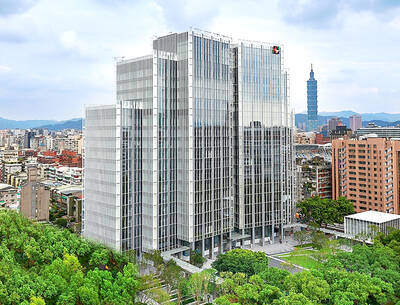■ TAIWAN
Private investment slows
Minister of Economic Affairs Shih Yen-shiang (施顏祥) said on Friday that private investment could reach NT$800 billion (US$24.8 billion) this year, falling short of the government’s target by about 20 percent. The administration had set a target of NT$1.001 trillion for new private investment this year, Shih said at a meeting aimed at expanding investment organized by the ministry. Citing figures compiled by the Industrial Development Bureau, Shih said that as of the end of last month, a total of 968 new investment projects worth NT$459.8 billion had been initiated this year. Shih attributed the lag to investor caution because of the global financial crisis.
■TRADE
Nations to discuss piracy
The next round of Anti-Counterfeiting Trade Agreement negotiations will be held in South Korea from Nov. 4 to Nov. 6, the US Trade Representative (USTR) said on Friday. The USTR, in a statement, said the talks would cover “enforcement procedures in the digital environment, criminal procedures to deal with counterfeiting and piracy and transparency issues.” The US has been working with Australia, Canada, the EU, Japan, Mexico, Morocco, New Zealand, Singapore, South Korea and Switzerland to hammer out an agreement.
■INTERNET
Twitter seeks translators
Twitter, the fast-growing micro-blogging service, is seeking volunteer French, German, Italian and Spanish translators to render its Web site into other languages. Twitter.com is currently only offered in English or Japanese. Biz Stone, a co-founder of the San Francisco-based startup, posted the notice in a blog post on Friday.
■ENERGY
EDF stake approved
US regulators have approved a plan for French-based EDF to take a stake in Constellation Energy Group, clearing a key hurdle for a new nuclear power plant in Maryland, the companies said on Friday. The US Nuclear Regulatory Commission “has approved the investment structure and license transfer” related to EDF’s acquisition of 49.99 percent of Constellation Energy’s nuclear assets, a joint statement said. The investment was previously reported to cost US$4.5 billion.
■SEMICONDUCTORS
National CEO to retire
National Semiconductor Corp’s Brian Halla will retire as chief executive officer, passing the job to his deputy, chief operating officer Don Macleod said. Halla, 63, will step down on Nov. 30, remaining as chairman, the Santa Clara, California-based company said on Friday. He plans to retire from the board on May 30. Macleod, 61, worked his way up through various sales, marketing and finance jobs. He joined National in 1978. During his tenure, Halla refocused National on analog chips, particularly those that control power in electronic devices.
■TELECOMS
Stylish phone unveiled
Samsung Electronics Co, Asia’s biggest mobile-phone maker, fashion-house Giorgio Armani SpA and Microsoft Corp, the world’s largest software maker, unveiled a smartphone on Friday, promising it would be a “style statement.” The phone with a price tag of 700 euros (US$1,033) is a touch-screen, bronze-colored device, personally designed by Giorgio Armani. It includes Windows Mobile 6.5 and “cutting-edge technology” from Samsung, the companies said at a presentation in Milan.

UNCERTAINTY: Investors remain worried that trade negotiations with Washington could go poorly, given Trump’s inconsistency on tariffs in his second term, experts said The consumer confidence index this month fell for a ninth consecutive month to its lowest level in 13 months, as global trade uncertainties and tariff risks cloud Taiwan’s economic outlook, a survey released yesterday by National Central University found. The biggest decline came from the timing for stock investments, which plunged 11.82 points to 26.82, underscoring bleak investor confidence, it said. “Although the TAIEX reclaimed the 21,000-point mark after the US and China agreed to bury the hatchet for 90 days, investors remain worried that the situation would turn sour later,” said Dachrahn Wu (吳大任), director of the university’s Research Center for

Alchip Technologies Ltd (世芯), an application-specific integrated circuit (ASIC) designer specializing in artificial-intelligence (AI) chips, yesterday said that small-volume production of 3-nanometer (nm) chips for a key customer is on track to start by the end of this year, dismissing speculation about delays in producing advanced chips. As Alchip is transitioning from 7-nanometer and 5-nanometer process technology to 3 nanometers, investors and shareholders have been closely monitoring whether the company is navigating through such transition smoothly. “We are proceeding well in [building] this generation [of chips]. It appears to me that no revision will be required. We have achieved success in designing

GROWING CONCERN: Some senior Trump administration officials opposed the UAE expansion over fears that another TSMC project could jeopardize its US investment Taiwan Semiconductor Manufacturing Co (TSMC, 台積電) is evaluating building an advanced production facility in the United Arab Emirates (UAE) and has discussed the possibility with officials in US President Donald Trump’s administration, people familiar with the matter said, in a potentially major bet on the Middle East that would only come to fruition with Washington’s approval. The company has had multiple meetings in the past few months with US Special Envoy to the Middle East Steve Witkoff and officials from MGX, an influential investment vehicle overseen by the UAE president’s brother, the people said. The conversations are a continuation of talks that

PROJECTION: KGI Financial said that based on its foreign exchange exposure, a NT$0.1 increase in the New Taiwan dollar would negatively impact it by about NT$1.7 billion KGI Financial Holding Co (凱基金控) yesterday said its life insurance arm has increased hedging and adopted other moves to curb the impact of the local currency’s appreciation on its profitability. “It is difficult to accurately depict the hedging costs, which might vary from 7 percent to 40 percent in a single day,” KGI Life Insurance Co (凱基人壽) told an investors’ conference in Taipei. KGI Life, which underpinned 66 percent of the group’s total net income last year, has elevated hedging to 55 to 60 percent, while using a basket of currencies to manage currency volatility, the insurer said. As different